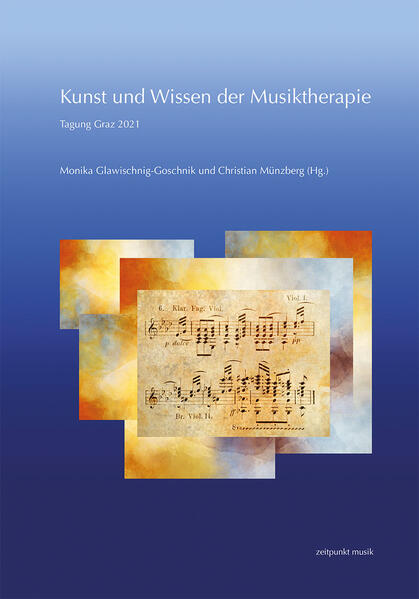
Zustellung: Di, 17.06. - Di, 24.06.
Versand in 6 Wochen
VersandkostenfreiBestellen & in Filiale abholen:
Musiktherapie als künstlerisch-wissenschaftliche Disziplin bewegt sich in unterschiedlichsten theoretischen Systemen. Seit ihren Anfängen haben sich im deutschsprachigen Raum über die Jahrzehnte Traditionen mit einem heute enormen fachlichen und wissenschaftlichen Kenntnisstand entwickelt. Die Wurzeln liegen vielfach in humanistisch-geisteswissenschaftlichen und psychotherapeutischen Konzepten. Mehr denn je sind derzeit Einflüsse und Konzepte aus dem anglo-amerikanischen Raum von Bedeutung. Musiktherapie ist wie jede wissenschaftlich fundierte Methode in einem stetigen Übergang. Theorien werden erweitert und neuen Erkenntnissen angepasst, neue Theorien müssen sich in ihrer Wirksamkeit beweisen. Die Grazer Musiktherapie (GRAMUTH) hat seit ihrer Gründung 2010 ebenfalls eine enorme Entwicklung vollzogen und wurde von einem interuniversitären Universitätslehrgang in ein reguläres Bachelor- und Masterstudium überführt. Die seit Beginn als Fortbildungsprogramm jährlich durchgeführte Fachtagung Grazer Musiktherapietag hat zu ihrem 10-jährigen Jubiläum die Kunst des Alten und die Kraft des Neuen in der Musiktherapie mit dem auch im Zuge der Corona-Epidemie zum Weitergehen motivierenden Aufruf Auf jetzt! zum Thema gemacht. Es wurden vier Traditionslinien der Musiktherapie aufgegriffen und mit Vorträgen und Workshops in ihrer Entwicklung und dem heutigen Kenntnisstand von namhaften VertreterInnen dargestellt. Dazu wurden neue Entwicklungen durch junge AbsolventInnen österreichischer Ausbildungen sowie eine aktuelle Forschungsarbeit und weitere Beiträge vorgestellt. Diese fundierten Beiträge der Musiktherapie in ihrer Kunstfertigkeit, ihrem Hintergrundwissen, aktuellem Kenntnisstand und in ihrer Methodik werden in diesem Buch nochmals zusammengefasst.
Music therapy as an artistic-scientific discipline moves within a wide variety of theoretical systems. Since its beginnings, traditions have been developed in the German-speaking world over the decades with an enormous amount of professional theoretical and practical experience and empirical scientific knowledge. In many cases, these roots lie in humanistic concepts and psychotherapeutic approaches. Currently, more than ever, influences and concepts from the Anglo-American world are gaining in importance. Nevertheless, the schools that have emerged in connection with psychotherapeutic concepts continue to appear as the more central approaches in the German-speaking world. This book points to the breadth of this knowledge, summarises central content-related and methodological core statements and can thus also contribute significantly to further basic research and teaching.
Music therapy, like any scientifically based method, is in a constant state of transition and development. Theories are expanded and adapted to new findings, new theories have to prove their effectiveness. Empirical evidence and studies show that music therapy has also established itself within the framework of scientific discourse.
The "Graz Music Therapy" (GRAMUTH) has also undergone an enormous development since its foundation in 2010 and was developed from an inter-university course to a regular Bachelor's and Master's programme in 2022.
Since the beginning, with the exception of the first Corona year, the "Grazer Musiktherapietag" (Graz Music Therapy Day) has been held annually and is now an internationally recognised specialist conference. For its 10th anniversary, which was postponed by one year, the content and scope of the conference was expanded and the theme was the "The Art of the Old and the Power of the New in Music Therapy" with the call to "Let's go!", which also motivated people to continue in the wake of the Corona epidemic.
Four lines of tradition in music therapy - depth-psychological and psychoanalytic, integrative, anthroposophical, and morphological - were presented by renowned representatives whose lectures and workshops covered developments and current state of knowledge. In addition, new developments such as functional music therapy with methods of "neurological music therapy" by young graduates of Austrian training programmes as well as a current research project on "receptive music therapy with depressive patients" and other contributions were presented. These well-founded contributions of music therapy, the description of their artistry, their background knowledge, the current state of knowledge of the respective schools and their methodology are summarised again in this book.
Jetzt reinlesen: Inhaltsverzeichnis(pdf)Music therapy, like any scientifically based method, is in a constant state of transition and development. Theories are expanded and adapted to new findings, new theories have to prove their effectiveness. Empirical evidence and studies show that music therapy has also established itself within the framework of scientific discourse.
The "Graz Music Therapy" (GRAMUTH) has also undergone an enormous development since its foundation in 2010 and was developed from an inter-university course to a regular Bachelor's and Master's programme in 2022.
Since the beginning, with the exception of the first Corona year, the "Grazer Musiktherapietag" (Graz Music Therapy Day) has been held annually and is now an internationally recognised specialist conference. For its 10th anniversary, which was postponed by one year, the content and scope of the conference was expanded and the theme was the "The Art of the Old and the Power of the New in Music Therapy" with the call to "Let's go!", which also motivated people to continue in the wake of the Corona epidemic.
Four lines of tradition in music therapy - depth-psychological and psychoanalytic, integrative, anthroposophical, and morphological - were presented by renowned representatives whose lectures and workshops covered developments and current state of knowledge. In addition, new developments such as functional music therapy with methods of "neurological music therapy" by young graduates of Austrian training programmes as well as a current research project on "receptive music therapy with depressive patients" and other contributions were presented. These well-founded contributions of music therapy, the description of their artistry, their background knowledge, the current state of knowledge of the respective schools and their methodology are summarised again in this book.
Mehr aus dieser Reihe
Produktdetails
Erscheinungsdatum
04. Juli 2023
Sprache
deutsch
Seitenanzahl
140
Reihe
zeitpunkt musik
Herausgegeben von
Monika Glawischnig-Goschnik, Christian Münzberg
Verlag/Hersteller
Produktart
kartoniert
Abbildungen
40 SW-Abb.
Gewicht
286 g
Größe (L/B/H)
9/170/240 mm
ISBN
9783752007107
Entdecken Sie mehr
Bewertungen
0 Bewertungen
Es wurden noch keine Bewertungen abgegeben. Schreiben Sie die erste Bewertung zu "Kunst und Wissen der Musiktherapie" und helfen Sie damit anderen bei der Kaufentscheidung.

































